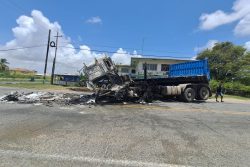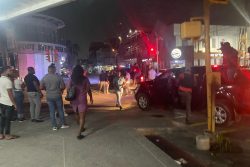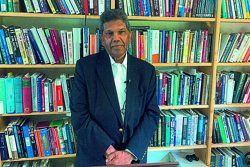President David Granger says that there needs to be another retreat to discuss the findings of the Commission of Inquiry (CoI) into the sugar industry after the first one was not attended by “several important ministers” due to overseas travel.
During Friday’s recording of the Ministry of the Presidency’s programme, `The Public Interest’ the President said “I don’t want to preempt what the cabinet is going to do. We still have to have a retreat (and) unfortunately because of a series of international meetings, culminating with the meeting in Paris, several important ministers, minister of finance, minister of foreign affairs, minister of governance were out of the country and a retreat was planned in which these very matters would be discussed.”
The need for another retreat represents a further delay in taking decisions on the troubled sugar industry. The initial report was to be presented on September 30, however this was postponed and a report was presented to Agriculture Minister Noel Holder on October 19. He later referred to the document as a “preliminary report.”
After two weeks of no comment by the Ministry, Holder revealed that a retreat was planned for November 28 aimed at familiarising members of cabinet with the findings. The retreat came and went without any word from the government. It was later revealed by Chairman of the Commission, Vibert Parvatan that Prime Minister Moses Nagamootoo had declared at the retreat that more dialogue may be necessary.
Neither the President nor Foreign Affairs Minister Carl Greenidge who has extensive knowledge of sugar matters were in attendance for the first retreat.
Holder had told Stabroek News that after the November 28 retreat cabinet was expected to make a decision on the sugar industry come December 1.
During the recording of the programme on Friday, President Granger said “There has to be change in the sugar industry but it is very important in terms of employment, in terms of the linkages with other products, for example molasses and rum and in terms of the whole structure of our economy I don’t think that we can do without sugar so it is not an easy decision that we can just shut down the entire industry and I don’t think that that is something that is going to happen.”
He also stated that “Once we decide that we are going to maintain the sugar industry or maintain a part of the sugar industry or privatize a part…maybe the field part could be privatized to individual farmers. I don’t want to predict what is going to happen.”
The government has not released the findings of the CoI to the public.
“As you know over the years there’s been a gradual shift eastward of sugar production. From Essequibo to Demerara, from Demerara to East Berbice/Corentyne so that drift is continuing to take place but we want to make sure at the same time we cut down the huge subventions we got to pay for the sugar industry, we maintain employment and we produce sugar at an economic cost which can be sold on the world market”, Granger added.
Meanwhile, head of GAWU, Komal Chand told Stabroek News that the tension between the union and GuySuCo was palpable and heavily influenced by the report’s contents remaining at cabinet level.
“We participated in the work of the commission. We feel now that the delay, the procrastination it is too important to have this report still embargoed. The commission’s work and what it solved we will only know when we see the full report,” Chand stated.
He stressed that “it was a long time since it was supposed to be presented, September 20 but not until October 19 and still it hasn’t been released to the members of the commission [they] haven’t gotten a copy.”
Chand told Stabroek News “We haven’t heard anything whatever in that [report]. The members of the cabinet met the team. After that nobody is aware of the way forward, when the report will be released, what is the government’s take on the report in terms of what they will accept…”
The sequestering of the report has had a direct impact on GAWU as GuySuCo has refused to discuss wages and salaries with it in the absence of the findings of the report.









